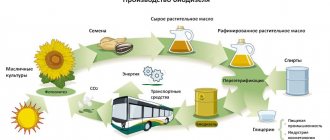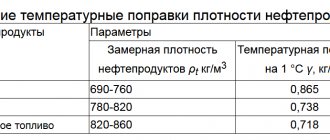Those who drive gasoline engines in moderately cold climates do not think about temperature problems with the fuel. But diesel is a different matter. If you neglect the seasonal replacement of diesel fuel, then when cold weather sets in, you can quickly and permanently immobilize your car.
At subzero temperatures, diesel fuel will stop pumping and will tightly clog all channels of the fuel equipment.
Features of summer diesel fuel
Literally a few degrees below zero will turn summer diesel fuel into a viscous substance, from which paraffins will begin to fall out.
In theory, if the fuel meets the standards, it should pass through the filter down to -8 degrees. But in practice it will be almost unusable and will begin to clog its pores already at -5. This is normal for summer trains, but it is detrimental to engine performance.
The filter will be the first to suffer. This alone is enough to stop the engine. But similar deposits will be throughout the line, in the tank, pipes, pumps and injectors.
Even just warming up the system to revive the engine and replace diesel fuel will be very difficult. For cold weather, regardless of the climatic characteristics of the region, winter diesel fuel should be used. The problem will arise without warning, so you need to take care of the motor in advance.
Freezing point
The exact composition of diesel fuel for various seasonal purposes is not standardized. They differ indirectly by thickness (viscosity) at a certain temperature. Winter varieties are approximately one and a half to two times less viscous.
Summer diesel fuel
Summer fuel is better and cheaper than all others, but only if used in weather conditions with positive temperatures. It thickens to the filterability threshold at -5 degrees.
Even as it approaches this indicator, the fuel will become cloudy and begin to form sediment. In modern power supply systems, when everything is designed for ideally pure fuel with strictly standardized physical characteristics, even the slightest appearance of solid or gel-like insoluble impurities is unacceptable.
We're not even talking about freezing. If the engine stops due to a violation of the mixture composition, then diesel fuel is definitely unsuitable, so it is pointless to talk about complete transformation into a solid phase.
This is interesting: Which wheels are better to drive in winter?
Moreover, the composition of the fuel by fraction greatly depends on the initial raw materials and the manufacturer’s technologies, and the consequences are frightening, so it is categorically unacceptable to use this grade at near zero temperatures. Even heating through the return lines will not help, the heat generation there is small, and the mass of diesel fuel in the tank is large.
Demi-season fuel
The intermediate grade, called interseasonal according to GOST, allows cooling at a filterability threshold of up to -15 degrees. At the same time, the useful characteristics of summer diesel fuel are preserved, in particular, the cetane number, which is important for softening the operating cycle of loaded turbocharged diesel engines with high filling rates and specific power.
Indicators for commercial varieties are usually met with some reserve, but you should not rely on this. Relatively speaking, this is fuel for the southern regions with their mild, but not always predictable winters.
For example, there may be a high temperature during the day, when it is desirable to feed the diesel with high-quality fuel, but there is a danger of it clouding with the formation of sediment and damage to the filters during slight frosts at night.
Winter diesel fuel
Winter varieties feel confident at low temperatures down to minus 25-30 degrees, but the specific design of the product must be taken into account.
It is possible that one will thicken before the filter stops working at -25, while others will tolerate -35. Typically, the specific threshold for use is indicated in the labeling of a given type of fuel; it must be precisely known to the driver from the certificate.
If you intend to use a diesel car in very extreme frosty conditions, then you will have to refuel exclusively with Arctic diesel fuel. It is filtered, depending on the brand, to -40 and even lower.
It may happen that local cooling exceeds all reasonable limits, but usually in automotive technology for such conditions special measures are used to heat the tank and fuel system, and the engines are not turned off in winter.
Results
Summer diesel fuel is a type of diesel fuel used in the warm season at positive ambient temperatures. In reviews of diesel fuel, car owners note its efficiency, good viscosity and density, which improve the softness and smoothness of the engine. The only nuances are the correct choice of fuel brand - many sellers dilute the fuel, which is why it loses its properties and can lead to fuel system problems. Since the minimum freezing point of summer diesel fuel is -5 o C, it must be used only at positive ambient temperatures.
How to choose and use diesel fuel all year round
You don’t have to worry about summer fuel, but in winter it’s better to choose diesel fuel exclusively at gas stations of large brands. The experience of motorists shows that commercial winter diesel fuel from well-known companies meets GOST requirements with a large margin.
Up to -25, problems do not arise with any product if it is indicated that it is for winter use. Below you should use exclusively Arctic diesel fuel; it won’t even become cloudy down to -35.
It is not worth buying fuel from small distributors in winter, since its properties can change unpredictably during storage and when mixed in tanks with summer residues.
Specific Gravity Measurement
Fuel density is measured using hydrometers. The density of diesel fuel is measured by hydrometers for petroleum products whose names begin with the letters AN, for example, such as ANT-1 or ANT-2. The greater the percentage of diesel fuel that is hydrocarbons having a high specific gravity, the greater the density of this diesel fuel. On the one hand, when such diesel fuel burns, more energy is released, on the other hand, it evaporates worse, is harder to ignite and does not burn in the cylinders without a residue. Since evaporation and ignition occur more easily in summer, summer diesel fuel has a higher specific gravity than winter diesel fuel.
Since GOST requires measuring the density of diesel fuel at a temperature of 20 ◦C, to correctly determine the density you need to bring a container with diesel fuel home and wait until it warms up in winter and cools down to +20 ◦C in summer. If you don’t have time to wait, you can measure the parameter you are interested in and the temperature of the diesel engine, and then recalculate what the result will be at 20 ◦C. To do this, you need to know that decreasing the temperature of diesel fuel by 1 ◦C increases its specific gravity by an average of 0.0007 g/cm3. And an increase in temperature correspondingly reduces the density by the same amount.
Is it possible to drive in winter on summer diesel fuel?
In severe frosts, such experiments on your own expensive motor are unacceptable. But in the most extreme cases and at slightly negative temperatures, you can add special compounds to the tank that lower the temperature threshold.
Such antigels allow it to change by a few degrees, but no more. You must first study the specific characteristics and procedure for use according to the manufacturer. And remember that this is only a temporary measure.
It is now unacceptable to dilute fuel with kerosene and especially gasoline, as old drivers did with outdated engines. The motor will not last long on such mixtures; its specific characteristics are too high; everything there already works close to the strength limit.
Warm up the plug
If the engine does not start after adding additives, then heating can solve the problem. As a rule, summer diesel fuel at near-zero temperatures forms a paraffin plug on the fine filter.
You need to find the fuel filter and warm it up. As a rule, it is located inside the engine compartment. It can be warmed up using warm, but not hot water. If you pour it from a thermos directly onto the filter housing, it will quickly heat up, after which the paraffin deposit will dissolve.
You can also heat the filter with a portable battery-powered hairdryer, but in this case there is a risk of draining the car battery.
How to recognize fake gasoline? There are five ways Read more
Signs of fuel freezing in a car
The first and main sign of exceeding the fuel resistance limit to frost will be the engine failure to start. It simply will not receive the required amount of diesel fuel to ignite and operate sustainably.
If freezing begins while driving, the diesel engine will lose traction, start to stall and will not be able to spin up to rated speed.
The usually transparent diesel fuel will be visually noticeable, followed by precipitation and crystallization. The filter on which they tried to start the engine with such fuel will become unusable and must be replaced. Driving on unfiltered fuel is unacceptable.
What is waxing, and why is it bad for a diesel car?
Diesel waxes, always found in diesel fuel, are long-chain hydrocarbons that are prone to crystal formation at low temperatures. These crystalline platelets block the filters in the actual "wax" chains. Combined long-chain hydrocarbons dramatically increase the viscosity of diesel fuel, which is bad for both the engine and the fuel pump. The presence of water in sufficiently large quantities causes another problem - the formation of ice crystals. This occurs at the freezing temperature of diesel fuel. The problem is that: a) water does not dissolve in any liquid hydrocarbons; b) these crystals at certain temperatures are already a solid substance, unlike paraffin, which is still liquid.
In both cases, diesel fuel will begin to flow again only when it is heated above the crystallization temperature.
The problem, it seemed, could be solved by adding a certain amount (from 7 to 10%) of biodiesel to diesel fuel. However, firstly, biodiesel fuel is expensive, and, secondly, it sometimes produces a thick substance that causes foaming of pure diesel fuel that does not contain additives.
Unlike paraffins (when crystals of united molecules break apart at elevated temperatures), a mixture of diesel fuel and biodiesel becomes cloudy and is in no hurry to turn back into regular fuel.
Turbid suspensions, which appear during the waxing process, clog the filters, thereby greatly overloading the fuel pump. As a result, gaps in moving parts are lost and dry friction processes begin. Since temperatures and pressures are high, particles of exfoliated metal quickly turn into metal powder, which first coagulates and then sinteres. And the pump is finished.
To prevent this from happening, it is necessary to use appropriate additives for biodiesel mixtures. In addition, there should be no water in the diesel fuel, which also blocks the filters.
How to defrost diesel fuel
It is useless to use anti-gels or other defrosting substances when sediment has already formed in the fuel, it is not filtered and the engine does not start. They simply will not get into places clogged with paraffins.
You can try to heat the narrowest place in the fuel system - the filter. This is where the traffic jam occurs in the first place. But all other areas, including the fuel tank, will have to be heated. Therefore, the cardinal solution would be to install the machine in a heated room.
Much depends on the complexity and modernity of the car. Old trucks were heated not only with a hairdryer, but even with a blowtorch. Now this is unacceptable.
Among the popular methods, one can note the creation of a kind of greenhouse made of plastic film over the car. Hot air from a heat gun is pumped through it. In mild frosts, the method works quite well, but you will have to spend time and a significant amount of electricity.
The film has good thermal conductivity, although it does not allow air to pass through, so it is better to build a shelter in several layers.










